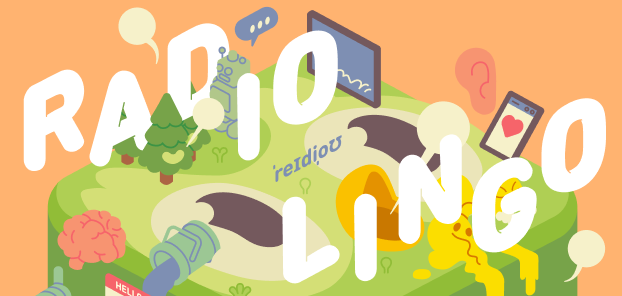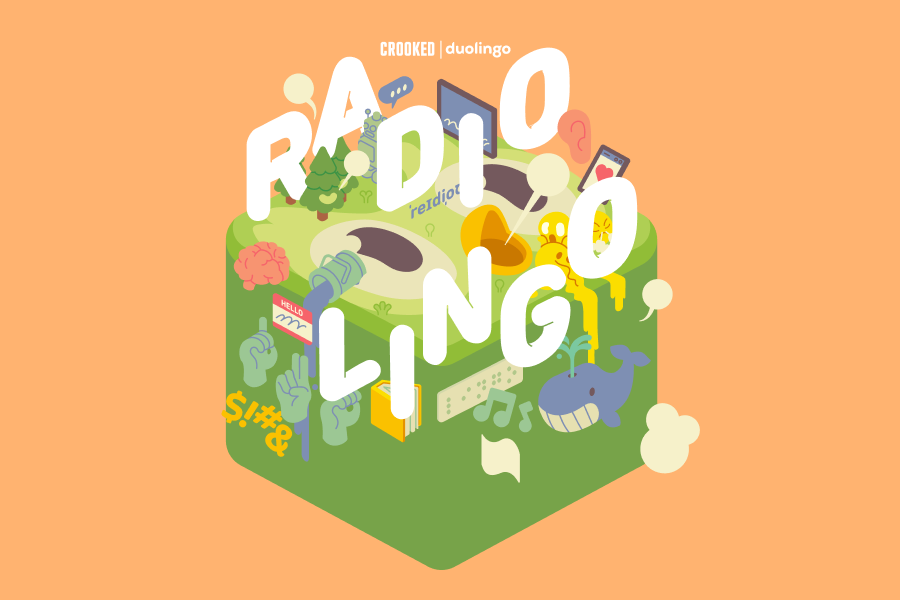Can a person’s name impact their professional outcomes? Is swearing good for you? Is Jason Momoa speaking a real language on Game of Thrones?
If you’re a language nerd like us, these are the kinds of questions that keep you up at night. (And even if you’re not, you’ve gotta admit you’re interested, right?)
To answer them, we launched a whole new podcast in partnership with Crooked Media: Radiolingo, a series that explores all the invisible ways that language shapes our world, and vice versa.

As we wrap up our first season of this fascinating, topical, and – in one episode, anyway – potty-mouthed series (it’s educational, we swear!), we’re here to highlight 3 surprising facts that will change everything you thought you knew about language.
And don’t forget to check out the entire first season of Radiolingo, now available on Spotify, Apple, or wherever you listen to podcasts.
Kids are capable of inventing whole new languages (and we’re not talking about baby babble)
Up until the 1970s in Nicaragua, there was no national sign language. Most deaf children had only the forms of signing they used at home with their families – and each family had their own system. But in the 1970s, the first schools for deaf students began to open their doors in Nicaragua, offering a chance for deaf children to come together.
When they first arrived, these students only knew their family's sign system. But very quickly, in contact with other deaf students, a new form of signing emerged. Teachers were trying to get these students to learn and write in Spanish… but soon they realized the students were communicating in a language all their own!
These students stayed together in the same school setting for years – which meant the oldest students' original school sign system had years to evolve and develop consistent patterns (grammar!). The younger kids entering the school then learned this form of signing, and it became known as Nicaraguan Sign Language – and today, it’s the language used by deaf Nicaraguans all across the country.
Pretty cool, right? To learn more, listen to the episode here.
Swearing can alleviate pain
Swearing is often seen as taboo or offensive – or in some social circles, damn good fun! But did you know that swearing can also have a physiological function?
There have been several studies on the relationship between swearing and pain tolerance. In one study, researchers at Keele University had participants immerse their hands in cold water, around 37 degrees Fahrenheit (3 degrees Celsius). They discovered that people who swore were able to tolerate the cold water for longer!
One theory is that swearing seems to activate the part of the brain that triggers humans’ fight or flight response, which can lead to a surge in adrenaline, a natural form of pain relief. So next time you stub your toe and hear a few unsavory words erupt from your mouth, don’t be too hard on yourself – you’re practicing pain management, drug-free!
To learn more, listen here.
We all have accents – and because of this, we all have biases, too
Maybe you think you speak “Standard English,” the kind with specific grammar rules you learned in English class in high school. Maybe you think you don’t have an accent, but your cousin who lives in Michigan and says “bah-gull,” instead of “bay-gull,” definitely does.
The truth is that no one actually speaks “Standard English.” We’re all constantly bending the rules and trafficking in new phrases, accents, and dialects to connect daily with members of our communities – and members of different communities. How you speak to a friend vs. your mother vs. a colleague vs. the teller at the bank is going to sound different depending on the person you’re addressing and your relationship to them. When parents wring their hands and bemoan the ways kids are ruining English with their Tik Tok talk, they’re participating in a historical, age-old fear that has no basis in the reality of actual spoken language. Plato bemoaned the same thing about young people in Greece, too!
The fact is, people just don't hear their own voices very well, and can’t be trusted to determine whether or not they have an accent, or what it sounds like. So next time you think you’re speaking “neutrally,” and other people are speaking “funny,” take a good long look in the mirror… and practice saying “bagel.”
Bonus Fact: “Zounds” was Queen Elizabeth I’s favorite swear word
Don’t know what Zounds means? You’ll have to listen to the episode to find out.
